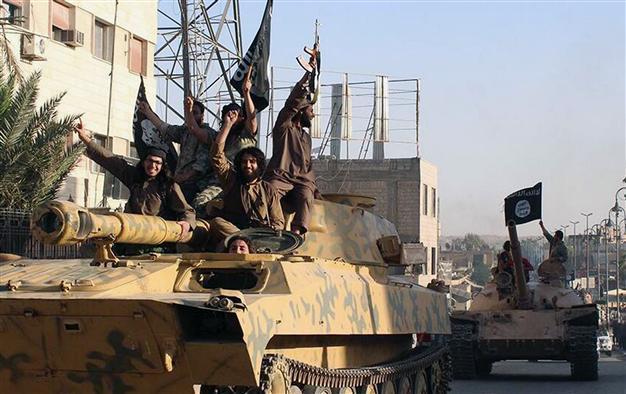Iran FM in Iraq as militants target main refinery
BAGHDAD - Agence France Presse

AP Photo
Iran, which is helping Iraq in its fight against jihadist-led militants, sent its foreign minister to Baghdad Aug. 24, as gunmen made a renewed push for the country's main oil refinery.The United States, whose warplanes have launched more than 90 air strikes against Islamic State (IS) jihadists in Iraq since August 8, has said operations against the group in Syria may also be necessary.
Washington has also ramped up its rhetoric over the grisly IS beheading in Syria of abducted American journalist James Foley, calling it "a terrorist attack against our country".
The toll rose Sunday to more than 35 dead in a string of attacks across Iraq the day before, as officials sought to defuse tensions after 70 people were gunned down at a Sunni mosque by suspected Shiite militiamen.
Iraq is struggling to regain ground lost to a major IS-led militant offensive which began in June and quickly overran large areas of five provinces, sweeping security forces aside.
Iranian Foreign Minister Mohammad Javad Zarif was to meet caretaker premier Nuri al-Maliki, prime minister-designate Haidar al-Abadi and other officials in Baghdad on Sunday.
Tehran has said it is advising Iraq's federal government and its autonomous Kurdish region, which are battling to push back IS-led militants.
However, evidence including the death of an Iranian pilot and the presence of several Iranian Su-25 warplanes points to a more direct military role by Iraq's Shiite neighbour to the east.
As Zarif visited Baghdad, security forces backed by air support battled a renewed militant push towards the Baiji refinery, which once accounted for some 50 percent of Iraq's supplies of refined petroleum products, and has been targeted in the past.
The latest unrest came as the death toll from a string of attacks in and north of Baghdad on Saturday rose to at least 37, a health official said.
Officials have been trying to calm tensions caused by an attack two days ago on a Sunni mosque in Diyala province.
The attack, in which worshippers were sprayed with machinegun fire, killed at least 70 people and wounded 20, officials said.
Dubbed by rights group Amnesty International a "massacre" that Iraqi authorities "must properly investigate", the attack threatens to increase anger among the Sunni Muslim minority with the Shiite-led government at a time when the anti-IS drive depends on their cooperation.
Parliament speaker, Salim al-Juburi, a Sunni, called on Saturday for political unity and said "the main aim (of the mosque attack) is to foil all the efforts that have been made to form a government".
"All the political entities condemned the crime, all of them expressed their anger about what happened," he said in televised remarks.
Premier-designate Abadi, a Shiite, urged "citizens to close ranks to deny the opportunity to the enemies of Iraq who are trying to provoke strife".
Army and police officers said the assault on the Musab bin Omair Mosque in Diyala came after Shiite militiamen were killed in clashes, while other sources said it followed a roadside bombing near a militia patrol.
Although some officers blamed IS for the attack, most accounts, including one from an eyewitness, pointed to Shiite militiamen.
The government turned to militias to bolster its flagging forces during the IS-led offensive, but in doing so it has encouraged a resurgence of groups involved in brutal sectarian killings in past years.
The United Nations, meanwhile, warned that the Shiite Turkmen-majority northern Iraqi town of Amerli is under threat of a "massacre" by jihadists who have besieged it for more than two months.
"The situation of the people in Amerli is desperate and demands immediate action to prevent the possible massacre of its citizens," UN Iraq envoy Nickolay Mladenov said in a statement.
Abadi and Iraq's top Shiite cleric, Grand Ayatollah Ali al-Sistani, both also called for efforts to help Amerli.
The killing by IS of American journalist Foley has stoked Western fears that territory seized by the militants in Syria and Iraq could become a launchpad for a new round of global terror attacks.
The 40-year-old freelance was kidnapped in northern Syria in November 2012.
In a video released online, a masked black-clad militant said Foley was killed in revenge for US air strikes against IS.
The supposed executioner, speaking with a south London accent, paraded a second American reporter, Steven Sotloff, in front of the camera and said he would also die if the air raids continued.
















